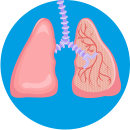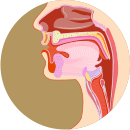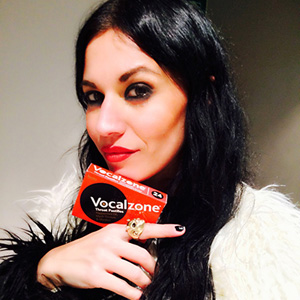No one voice is the same, and in turn that means that there isn’t a defined threshold as to when someone is overusing their voice. A number of factors such as the volume, intensity and tone at which you speak, along with external factors can all contribute to vocal strain. It’s important to know how your voice works, to understand some of the implications should you overwork or strain it.
How does the voice work?
Did you know that it takes the use of over 100 muscles to be able to speak a single phrase? Add to that the fact that your vocal folds will vibrate anywhere between 100 to 1000 times per second, and you quickly begin to build up a picture of how easy it can be to strain your voice.
Your voice works from a combination of three primary outlets:

The Power Source
(the lungs)
The power in your voice comes from the air that you inhale and exhale, which causes an air stream in the trachea. The stronger this airstream is, the stronger your voice will be.
It’s important to have clear passageways when performing, as it’s this intake or airflow which helps power the vocal folds.

The Vibratory Source
(the vocal folds)
Your vocal folds are composed of twin foldings of mucous membrane stretched across the larynx. Whilst in use, they can vibrate anything between 100 to 1000 times per second, to help create the sound you are trying to achieve.
As a performer, you’re creating a variety of different sounds and tones, so your vocal folds are working hard to create those different tones. Vocal folds differ from person to person, and generally speaking, men have thicker vocal folds compared to women.

The Amplification Source
(mouth, throat and nose)
Without an amplification source, your voice would sound like a humming sound. It’s your mouth, throat and nose which create your voice. These body parts act as resonators; essentially giving you the voice people hear when you perform.
Like fingerprints, every voice is unique; and whilst some can closely mimic another’s voice it’s impossible to replicate it identically.
Symptoms of voice misuse / overuse
With so many body parts working together to power your voice, prolonged use can result in vocal strain. Many performers attempt to train their voices to handle prolonged use; after all it’s like any other muscle and can be strengthened, but it takes time, and can still affect anyone. Take a professional athlete; they train on a very regular basis, but can still incur strains and injuries to their muscles.
There are a number of external factors which also contribute to vocal strain. A lot of performance venues are designed in a way to help amplify, but this isn’t necessarily the case at home or at work; general purpose buildings are rarely designed with acoustics in mind, making your voice have to work harder. Then there is the environment in which you are working, the temperature, air conditioning, and in earlier years smoke. .
The technical term for voice strain is ‘Muscle Tension Dysphonia’ and a handful of symptoms to look out for include:
- Sore throat
- Gradual voice loss (if sudden, seek immediate medical advice as you may have a vocal cord hemorrhage)
- Hoarse voice
- Tickly cough
- Difficulty projecting
- Deepening of the voice
Generally, you know you have strained your voice if you are feeling any pain or discomfort during or immediately after prolonged use of your voice, but this strain disappears once your voice has been suitably rested.
There are a few considerations:
- If you are regularly experiencing these symptoms after a using your voice, or after little to no use, go and see a doctor as continued strain can lead to injury.
- If the discomfort remains after rest, you may have an underlying voice problem/condition and should go and visit your doctor as soon as possible.
- If you’re ever unsure, go and see a doctor – It’s better to be safe than sorry!
Precautions and Recovery
There are a number of precautions you can take to help look after your voice, as well as a number of actions you can take should you begin to experience vocal strain.
Here are some tips:

Keep hydrated
Water keeps the vocal folds lubricated, preventing the dryness and friction which can result in vocal discomfort, hoarseness and sore throats.

Warm up your voice
Vocal warm ups aren’t just for performers, but should be used if you are reliant on your voice. Take it as a form of exercise to help build up resistance in your voice.

Wrap up warm
Cold air not only makes your more vulnerable to a cold or flu, also dries up your throat. Wrap it up, and protect it from the elements.

Rest your voice
Don’t use your voice unnecessarily, you can strain your voice by talking, shouting and even whispering! If the strain already exists, the best course of action is a combination of rest, hydration and Vocalzone which will help soothe the discomfort.

Avoid caffeine and alcohol
We get it, a cup of coffee powers us at work right? It may keep you awake, but it’s making your voice work even harder as it dehydrates you. We’re not telling you to not drink coffee, but try and balance it out with water to counter the effects. Same can be said with alcohol, if you drink and have had one too many, you know one of the first things you want when you wake up is a glass of water (and probably some aspirin too!).

Smoking affects your voice
For more information on the effects of smoking on your voice, check out the Smokers section on our website.

Don’t use your voice when you’re unwell
Granted, sometimes not using your voice is pretty much impossible if you have to go to work and can’t afford the time off, but use it sparingly, and remember that continued strain can lead to a longer lasting, more detrimental voice problem.

Practice good posture & breathing techniques
It’s essential that you maintain a good posture and breathing technique as these all support your vocal mechanisms. Poor habits make your body work even harder to use your voice, hence increasing the risk of vocal strain.

Use Vocalzone as part of a combination of the above
Find out more about the benefits of using Vocalzone below.
We have a number of hints, tips and vocal exercises available on the voice care section over on The Record Blog.
How Vocalzone supports the voice:
Vocalzone can help to support your voice at any point of the day. To understand how it works, it’s important to first understand the benefits of some of the key ingredients of the pastille.
Myrrh Tincture
The myrrh in Vocalzone acts as an anti-inflammatory on swollen capillaries. As an astringent, it also helps regulate mucous retention. It also stimulates blood circulation, helping to fight infection and speed healing when you have a cold.
Known benefits:
- Anti-inflammatory
- Antioxidant
- Antiseptic
- Antimicrobial
Peppermint Oil
Peppermint Oil acts as an aromatic calmative within Vocalzone Throat Pastilles. Inhaling this essential oil can also help to unclog blocked sinuses and clear the airways.
Known benefits:
- Natural energizer
- Clears blocked sinuses
- Natural coolant
- Skin relaxant
Menthol
The menthol in Vocalzone helps to soothe and relieve throat irritation. This is achieved by the natural cooling properties of this essential oil.
Known benefits:
- Analgesic
- Antiseptic
- Antispasmodic
- Decongestant
When Vocalzone Can Help
You can use Vocalzone before, during and after using your voice.

Before using your voice
Vocalzone can be a great aid to take before a long day at work. The peppermint oil and menthol work together as a decongestant to help clear any blocked sinuses and nasal cavities, which will allow you to breathe freely and get the most out of your voice. It’s essential to drink plenty of water in conjunction with taking Vocalzone to remain as hydrated as possible.

Whilst using your voice
It could be a busy day, maybe you’re using your voice more than you expected to when you woke up; and then you begin to feel vocal strain. It’s common for people to use Vocalzone whilst working or using your voice, as a way of actively regulating mucous retention, and soothing any discomfort without masking any underlying problems, or numbing the vocal folds.

After using your voice
Vocalzone has long been used to aid in recovery of the voice. With myrrh being an astringent, it will help to reduce the inflammation of swollen capillaries, and it also stimulates the mucous membranes which allows for secretion and regulation of the mucous after prolonged use of the voice.
Don’t forget, Vocalzone should always be used in complement with your voice care routine, and should never replace it!

What People Say About Vocalzone
Browse our blog for music and entertainment news, exclusive Live Sessions and Vocal Care tips & exercises from the V-Team.









